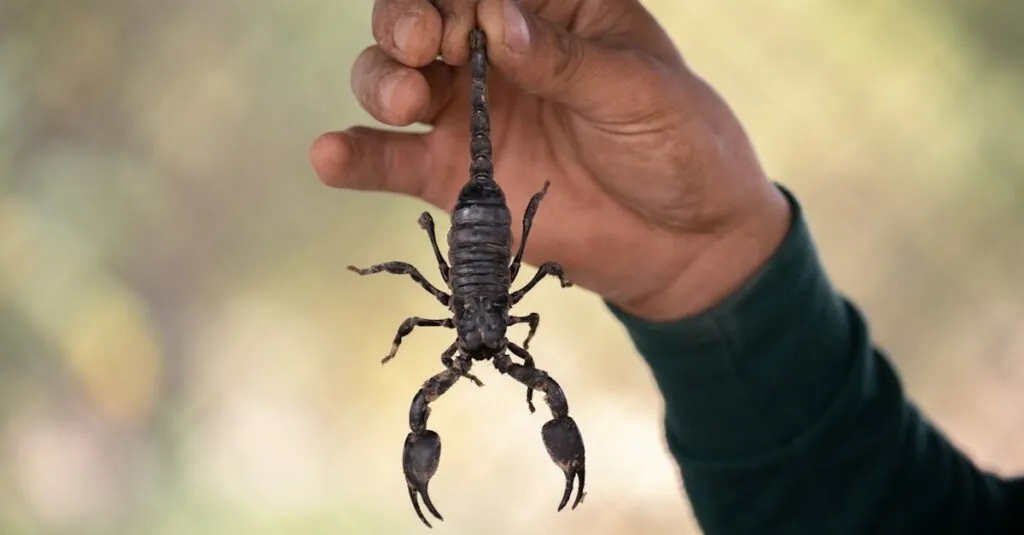Table of Contents
ToggleWhen summer rolls around, many folks look forward to barbecues and lazy afternoons in the sun. But lurking nearby are those uninvited guests—wasps. These buzzing bandits can turn a delightful picnic into a scene from a horror movie faster than you can say “pass the potato salad.” Understanding how to manage these pesky pests is crucial for enjoying the season without fear of a surprise sting.
Understanding Pest Control Wasps
Wasps often disrupt summer outdoor activities, so understanding them aids in effective management. Identifying the types and recognizing their roles in the ecosystem proves essential for pest control.
Types of Wasps Commonly Found
Many wasp species inhabit various regions. Yellowjackets are known for their aggressive nature and frequent presence at picnics. Paper wasps build umbrella-shaped nests and are typically less confrontational. Hornets, which belong to the wasp family, can be larger and more defensive, often targeting perceived threats. Garden wasps can also be present, although they are less likely to sting unless provoked. Encounters with these species necessitate different control strategies.
The Role of Wasps in the Ecosystem
Wasps play an important role in maintaining ecological balance. They help control pest populations by preying on various insects, including caterpillars and aphids. Pollination is another significant contribution they make, assisting in the reproduction of several plants. Certain wasps even contribute to the decomposition process, breaking down organic matter. Recognizing these benefits can shift perspectives on pest control and encourage a more balanced approach to managing these creatures.
Methods of Pest Control for Wasps
Effective pest control for wasps encompasses various strategies, focusing on both chemical and natural methods.
Chemical Control Options
Chemical control options include insecticides specifically designed for wasp management. These products often contain active ingredients that eliminate wasps quickly upon contact. It’s crucial to apply these treatments during the evening when wasps are less active and return to their nests. Safety precautions must be taken, such as wearing protective clothing and following manufacturer instructions. Professional pest control services provide additional expertise, ensuring that treatments are both safe and effective.
Natural Pest Control Techniques
Natural pest control techniques offer eco-friendly alternatives to chemical methods. Common approaches include using traps made from sugar water or vinegar to lure wasps. Essential oils like peppermint or clove can repel wasps when sprayed around areas prone to infestations. Additionally, maintaining cleanliness during outdoor activities helps deter wasps from invading food or waste. These methods reduce reliance on chemicals while promoting a balanced ecosystem. Homeowners often benefit from combining various techniques for optimal results.
Precautions When Dealing with Wasps
Managing wasps effectively involves taking specific precautions to minimize risks during outdoor activities. Following safety guidelines can help prevent stings and ensure a more enjoyable experience.
Safety Measures for Homeowners
Staying calm around wasps is crucial. Quick movements or swatting can provoke them. Wearing light-colored clothing instead of dark can reduce attraction. Avoiding strong scents from perfumes or lotions also helps. Covering food and drinks can deter wasps from intruding at outdoor events. Keeping trash tightly sealed minimizes potential nests and populations. Utilizing insect netting around eating areas adds another layer of protection. Assessing surroundings for nests before outdoor activities ensures safety. Listening for buzzing noises often indicates nearby wasp activity.
When to Call a Professional
Recognizing when to seek professional help is essential for effective wasp control. A visible nest near high-traffic areas necessitates immediate action. Allergic reactions to wasp stings can pose serious health risks, making quick intervention vital. Difficulty identifying the wasp species may require expert assistance to implement the correct control strategies. If large numbers of wasps persist despite DIY efforts, timely consultation with pest control professionals ensures safety. Observing significant nest size suggests the need for specialized treatments. Enlisting a professional provides knowledge of safe removal methods and environmental considerations.
Common Myths About Wasps
Many misconceptions surround wasps. Understanding these myths helps in managing their presence effectively.
Debunking Misconceptions
One common myth suggests that all wasps are aggressive. Not every wasp species will sting unless threatened, as many, like the solitary wasp, prefer to avoid conflict. Another belief holds that wasps die after stinging, similar to honeybees. In reality, wasps can sting multiple times, posing continued threats. Some also think wasps only exist to disturb summer picnics. Wasps play crucial roles in ecosystems, including pest control and pollination.
Understanding Wasp Behavior
Wasp behavior can appear unpredictable. Wasps often become more active during late summer when food resources diminish. At this time, they search for sugary substances, increasing their presence around outdoor gatherings. Most wasps, such as yellowjackets and paper wasps, become less hostile when left undisturbed. Notably, they build nests in hidden areas, making proactive monitoring essential. People often overlook the fact that wasps communicate through pheromones, signaling danger to their colonies. Understanding these behaviors promotes safer interactions during outdoor events.
Managing wasps effectively is key to enjoying outdoor gatherings without the worry of stings. By understanding their behavior and ecology homeowners can adopt a balanced approach to pest control. Combining chemical and natural methods often yields the best results.
Staying vigilant and taking proactive measures can significantly reduce the chances of unwanted encounters with these pests. When necessary seeking professional help ensures safety and proper management. With the right strategies in place outdoor events can remain enjoyable and wasp-free.







